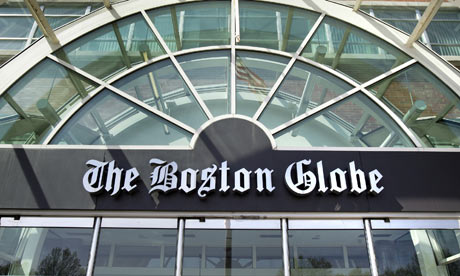
Stephen Kinzer
Stephen Kinzer is a senior fellow at the Watson Institute for International Studies at Brown University. Follow him on Twitter @stephenkinzer. Stephen Kinzer is an award-winning author and foreign correspondent who has covered more than 50 countries on five continents. His articles and books have led the Washington Post to place him “among the best in popular foreign policy storytelling.” He was Latin America correspondent for The Boston Globe, and then spent more than 20 years working for the New York Times, with extended postings in Nicaragua, Germany, and Turkey. He is a visiting fellow at the Watson Institute for International Studies at Brown University. His most recent book is “The Brothers: John Foster Dulles, Allen Dulles, and Their Secret World War.”
 AMERICANS ARE IN near-panic over the danger posed by Islamic terrorists. That danger, however, pales beside an emerging new one. President Obama has proposed a frighteningly wrongheaded plan to "modernize” our nuclear arsenal at the unfathomable cost of about $1 trillion over the next 30 years. Terror will never reach even 1 percent of our population. Nuclear "modernization” increases the prospect of true devastation.
AMERICANS ARE IN near-panic over the danger posed by Islamic terrorists. That danger, however, pales beside an emerging new one. President Obama has proposed a frighteningly wrongheaded plan to "modernize” our nuclear arsenal at the unfathomable cost of about $1 trillion over the next 30 years. Terror will never reach even 1 percent of our population. Nuclear "modernization” increases the prospect of true devastation.
The nuclear threat seems diffuse and faraway, while the prospect of a deranged fanatic shooting up a cinema is as vivid as today’s news. Perhaps we have been lulled into security by the fact that no nuclear weapon has been used since 1945. Voices trying to alert us to the true threat are drowned out in a frenzy of over-the-top campaign speeches and TV rants about crazed Muslims.
The most sobering of these voices belongs to William Perry, who during the 1970s and ’80s directed the development of air-launched nuclear cruise missiles and later became secretary of defense. Now Perry is campaigning against Obama’s plan to develop and buy 1,000 new missiles with adjustable nuclear capacity, 100 new long-range bombers, and a new fleet of nuclear-armed submarines. He warns that if the plan becomes real, disputes among nations will be "more likely to erupt in nuclear conflict than during the Cold War.”
When Perry was directing America’s last nuclear buildup, he and others argued that it was necessary to compensate for NATO’s relatively weak conventional power in countries around the Soviet Union. That rationale evaporated when the Cold War ended, but it still shapes our defense policy.
Obama’s proposed "modernization” increases our vulnerability, not our security. The first and most obvious reason is that it will certainly lead other countries to seek equivalent arsenals of their own. It is especially upsetting to Russia, which already feels under increasing American threat as a result of our military maneuvers on its borders and the fact that many of our missiles are positioned in Germany, Turkey, and other countries near its territory. The Russian defense minister recently announced that in response to Obama’s plan, Russia will "bring five new strategic nuclear missile regiments into service.” China would surely match that escalation. If it does so, India will follow. Then Pakistan will jump into the race. It is a recipe for disaster.
The cruise missiles Obama wants to build could be used to deliver either conventional or nuclear payloads. If an air defense controller in another country sees one incoming on radar, he or she would have no way of knowing whether it was armed to destroy a building or an entire city. The temptation to launch nuclear retaliation could be irresistible.
Proliferation of nuclear weapons also increases the possibility that one will fall into the hands of terrorists. Perry has his own "nuclear nightmare, born of long and deep experience.” In it, a gang secures enough uranium for a rudimentary bomb, slips it into Washington, and detonates it on Pennsylvania Avenue. "And yet,” Perry laments, "while this catastrophe would result in a hundred times the casualties of 9/11, it is only dimly perceived by the public.”
Besides these grave dangers — global proliferation, accidental war, and nuclear terror — there is another: national bankruptcy. Obama’s project is ruinously expensive. Admiral Mike Mullen, former chairman of the Joint Chiefs of Staff, calls it "spending ourselves into oblivion.” He describes our skyrocketing national debt as "the most significant threat to our national security.”
Now is the time to stop this program. So far, enthusiasm for it is confined to the White House and Pentagon. Once it is launched, rich procurement contracts will be portioned out to the districts of influential members of Congress. That will produce a self-interested constituency and give the project unstoppable momentum.
Nuclear weapons are useful for deterrence only. The United States has more than enough for that purpose. Investing huge sums in a new arsenal will not protect us from tomorrow’s threats. Most depressing, the proposal for this investment comes from a president who campaigned on a pledge to reduce and seek to eliminate nuclear weapons — and who won a Nobel Peace Prize for his apparent sincerity. Keeping our country safe requires agile thinking, not reliance on policies shaped for a bygone age.



.jpg/250px-ElbeDay1945_(NARA_ww2-121).jpg)





